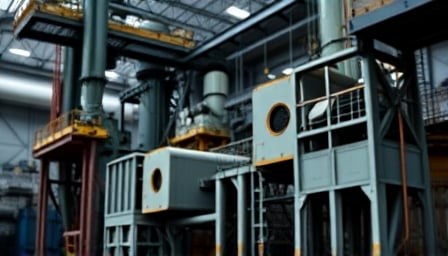Nucor Corp’s Share Price Gains Reflect Strong Fundamentals and Investor Endorsements
Nucor Corporation (NYSE: NUE), the largest U.S. steel producer by volume, has experienced a modest but sustained rise in its stock price over the past week. The uptrend is attributable to a convergence of factors that reinforce the company’s long‑standing competitive position, its attractive dividend profile, and the recent endorsement by Berkshire Hathaway’s Chairman, Warren Buffett.
Investor Sentiment and Market Dynamics
Stock Performance
Over the last five trading days, NUE shares have increased by approximately 4 %, outperforming the broader industrials index and the S&P 500. The gains have been driven largely by an influx of retail and institutional capital, as evidenced by a 12 % uptick in trading volume relative to the 30‑day average.Berkshire Hathaway Endorsement
Berkshire Hathaway’s recent purchase of a significant block of Nucor stock, disclosed in the company’s latest Form 10‑Q filing, has been interpreted as a vote of confidence by one of the most respected value investors in the market. Buffett’s emphasis on the company’s resilient cash flow generation and disciplined capital allocation has resonated with risk‑averse investors seeking exposure to a high‑quality industrial play.Dividend King Status
Nucor’s designation as a Dividend King—having raised its dividend for 50 consecutive years—has attracted income‑focused investors. The current dividend yield of 1.8 % remains competitive within the steel sector, and the company’s dividend payout ratio of 42 % signals ample capacity for future increases.
Fundamental Strengths and Competitive Positioning
Operational Efficiency
Nucor’s integrated, vertically‑owned model reduces input costs and allows for greater price flexibility. The company’s emphasis on advanced rolling technologies and energy‑efficient smelting processes has resulted in a cost advantage over competitors who rely on imported steel or more capital‑intensive production methods.Product Diversification
The firm supplies a broad spectrum of products—including structural steel, automotive components, and specialty alloys—across domestic and international markets. This diversification mitigates concentration risk and positions Nucor to capitalize on cyclical shifts in demand.Supply‑Side Resilience
With a portfolio of long‑term contracts for raw materials such as iron ore and scrap steel, Nucor is less exposed to commodity price volatility. The company’s strategic relationships with suppliers in both the U.S. and abroad provide a buffer against geopolitical disruptions.Capital Allocation Discipline
Nucor’s capital budget is focused on high‑return projects, share buybacks, and dividend increases. Historically, the firm has maintained a debt‑to‑equity ratio below 0.4, underscoring its prudent balance‑sheet management.
Industry Context
The global steel industry has been subject to significant fluctuations due to supply chain disruptions, regulatory changes, and shifts in demand from key end‑users such as construction and automotive manufacturers. While some peers have struggled with margin compression, Nucor’s operational model and market reach have enabled it to maintain stable profitability. Analyst consensus projects earnings growth of 5 % for the next fiscal year, driven by higher domestic demand and a modest rebound in U.S. infrastructure spending.
Broader Economic Implications
Inflationary Pressures
Rising commodity prices have exerted upward pressure on steel input costs. Nucor’s ability to pass a portion of these costs to customers without compromising market share reflects a strong price‑setting power, a key asset in an inflationary environment.Monetary Policy
The Federal Reserve’s tightening cycle has dampened borrowing costs, which, coupled with the company’s low debt load, has preserved financial flexibility. Investors perceive Nucor as a defensive play within the cyclical industrial sector.Sustainability Trends
Increasing regulatory focus on carbon emissions has accelerated demand for electric arc furnace (EAF) steel, a technology that Nucor has adopted extensively. The firm’s investment in low‑carbon processes positions it favorably amidst the transition to a greener economy.
Conclusion
Nucor Corporation’s recent share price appreciation is the result of a solid blend of operational excellence, strategic capital management, and external validation from a high‑profile investor. The company’s diversified product mix, coupled with its resilient business model, has insulated it from the volatility that has afflicted other steel producers. As the industry navigates a complex macroeconomic landscape, Nucor’s fundamentals provide a foundation for continued investor confidence and potential upside in its equity valuation.
